- Home
- Roald Dahl
Completely Unexpected Tales: Tales of the Unexpected. More Tales of the Unexpected Page 10
Completely Unexpected Tales: Tales of the Unexpected. More Tales of the Unexpected Read online
Page 10
He rested for the remainder of the afternoon, and at seven-thirty Mason announced dinner. The bottle of wine was on the table and he began to drink it. He didn't give a damn about the way Mason watched him as he refilled his glass. Three times he refilled it; then he left the table saying that he was not to be disturbed and returned to the living-room. There was quarter of an hour to wait. He could think of nothing now except the coming concert. He lay back in the chair and allowed his thoughts to wander deliciously towards eight-thirty. He was the great composer waiting impatiently in his dressing-room in the concert-hall. He could hear in the distance the murmur of excitement from the crowd as they settled themselves in their seats. He knew what they were saying to each other. Same sort of thing the newspapers had been saying for months; Botibol is a genius, greater, far greater than Beethoven or Bach or Brahms or Mozart or any of them. Each new work of his is more magnificent than the last. What will the next one be like? We can hardly wait to hear it! Oh yes, he knew what they were saying. He stood up and began to pace the room. It was nearly time now. He seized a pencil from the table to use as a baton, then he switched on the radio. The announcer had just finished the preliminaries and suddenly there was a burst of applause which meant that the conductor was coming on to the platform. The previous concert in the afternoon had been from gramophone records, but this one was the real thing. Mr Botibol turned around, faced the fireplace and bowed graciously from the waist. Then he turned back to the radio and lifted his baton. The clapping stopped. There was a moment's silence. Someone in the audience coughed. Mr Botibol waited. The symphony began.
Once again, as he began to conduct, he could see clearly before him the whole orchestra and the faces of the players and even the expressions on their faces. Three of the violinists had grey hair. One of the cellists was very fat, another wore heavy brown-rimmed glasses, and there was a man in the second row playing a horn who had a twitch on one side of his face. But they were all magnificent. And so was the music. During certain impressive passages Mr Botibol experienced a feeling of exultation so powerful that it made him cry out for joy, and once during the Third Movement, a little shiver of ecstasy radiated spontaneously from his solar plexus and moved downward over the skin of his stomach like needles. But the thunderous applause and the cheering which came at the end of the symphony was the most splendid thing of all. He turned slowly towards the fireplace and bowed. The clapping continued and he went on bowing until at last the noise died away and the announcer's voice jerked him suddenly back into the living-room. He switched off the radio and collapsed into his chair, exhausted but very happy.
As he lay there, smiling with pleasure, wiping his wet face, panting for breath, he was already making plans for his next performance. But why not do it properly? Why not convert one of the rooms into a sort of concert-hall and have a stage and rows of chairs and do the thing properly? And have a gramophone so that one could perform at any time without having to rely on the radio programme. Yes by heavens, he would do it!
The next morning Mr Botibol arranged with a firm of decorators that the largest room in the house be converted into a miniature concert-hall. There was to be a raised stage at one end and the rest of the floor-space was to be filled with rows of red plush seats. 'I'm going to have some little concerts here,' he told the man from the firm, and the man nodded and said that would be very nice. At the same time he ordered a radio shop to instal an expensive self-changing gramophone with two powerful amplifiers, one on the stage, the other at the back of the auditorium. When he had done this, he went off and bought all of Beethoven's nine symphonies on gramophone records, and from a place which specialized in recorded sound effects he ordered several records of clapping and applauding by enthusiastic audiences. Finally he bought himself a conductor's baton, a slim ivory stick which lay in a case lined with blue silk.
In eight days the room was ready. Everything was perfect: the red chairs, the aisle down the centre and even a little dais on the platform with a brass rail running round it for the conductor. Mr Botibol decided to give the first concert that evening after dinner.
At seven o'clock he went up to his bedroom and changed into white tie and tails. He felt marvellous. When he looked at himself in the mirror, the sight of his own grotesque shoulderless figure didn't worry him in the least. A great composer, he thought, smiling, can look as he damn well pleases. People expect him to look peculiar. All the same he wished he had some hair on his head. He would have liked to let it grow rather long. He went downstairs to dinner, ate his food rapidly, drank half a bottle of wine and felt better still. 'Don't worry about me, Mason,' he said. 'I'm not mad. I'm just enjoying myself.'
'Yes, sir.'
'I shan't want you any more. Please see that I'm not disturbed' Mr Botibol went from the dining-room into the miniature concert-hall. He took out the records of Beethoven's First Symphony, but before putting them on the gramophone, he place two other records with them. The one, which was to be played first of all, before the music began, was labelled 'prolonged enthusiastic applause'. The other, which would come at the end of the symphony, was labelled 'Sustained applause, clapping, cheering, shouts of encore'. By a simple mechanical device on the record changer, the gramophone people had arranged that the sound from the first and the last records - the applause - would come only from the loudspeaker in the auditorium. The sound from all the others - the music - would come from the speaker hidden among the chairs of the orchestra. When he had arranged the records in the correct order, he placed them on the machine but he didn't switch on at once. Instead he turned out all the lights in the room except one small one which lit up the conductor's dais and he sat down in a chair up on the stage, closed his eyes and allowed his thoughts to wander into the usual delicious regions: the great composer, nervous, impatient, waiting to present his latest masterpiece, the audience assembling, the murmur of their excited talk, and so on. Having dreamed himself right into the part, he stood up, picked up his baton and switched on the gramophone.
A tremendous wave of clapping filled the room. Mr Botibol walked across the stage, mounted the dais, faced the audience and bowed. In the darkness he could just make out the faint outline of the seats on either side of the centre aisle, but he couldn't see the faces of the people. They were making enough noise. What an ovation! Mr Botibol turned and faced the orchestra. The applause behind him died down. The next record dropped. The symphony began.
This time it was more thrilling than ever, and during the performance he registered any number of prickly sensations around his solar plexus. Once, when it suddenly occurred to him that this music was being broadcast all over the world, a sort of shiver ran right down the length of his spine. But by far the most exciting part was the applause which came at the end. They cheered and clapped and stamped and shouted encore! encore! encore! and he turned towards the darkened auditorium and bowed gravely to the left and right. Then he went off the stage, but they called him back. He bowed several more times and went off again, and again they called him back. The audience had gone mad. They simply wouldn't let him go. It was terrific. It was truly a terrific ovation.
Later, when he was resting in his chair in the other room, he was still enjoying it. He closed his eyes because he didn't want anything to break the spell. He lay there and he felt like he was floating. It was really a most marvellous floating feeling, and when he went upstairs and undressed and got into bed, it was still with him.
The following evening he conducted Beethoven's - or rather Botibol's - Second Symphony, and they were just as mad about that one as the first. The next few nights he played one symphony a night, and at the end of nine evenings he had worked through all nine of Beethoven's symphonies. It got more exciting every time because before each concert the audience kept saying 'He can't do it again, not another masterpiece. It's not humanly possible.' But he did. They were all of them equally magnificent. The last symphony, the Ninth, was especially exciting because here the composer surprised and delighted ev
eryone by suddenly providing a choral masterpiece. He had to conduct a huge choir as well as the orchestra itself, and Benjamino Gigli had flown over from Italy to take the tenor part. Enrico Pinza sang bass. At the end of it the audience shouted themselves hoarse. The whole musical world was on its feet cheering, and on all sides they were saying how you never could tell what wonderful things to expect next from this amazing person.
The composing, presenting and conducting of nine great symphonies in as many days is a fair achievement for any man, and it was not astonishing that it went a little to Mr Botibol's head. He decided now that he would once again surprise his public. He would compose a mass of marvellous piano music and he himself would give the recitals. So early the next morning he set out for the showroom of the people who sold Bechsteins and Steinways. He felt so brisk and fit that he walked all the way, and as he walked he hummed little snatches of new and lovely tunes for the piano. His head was full of them. All the time they kept coming to him and once, suddenly, he had the feeling that thousands of small notes, some white, some black, were cascading down a shute into his head through a hole in his head, and that his brain, his amazing musical brain, was receiving them as fast as they could come and unscrambling them and arranging them neatly in a certain order so that they made wondrous melodies. There were Nocturnes, there were Etudes and there were Waltzes, and soon, he told himself, soon he would give them all to a grateful and admiring world.
When he arrived at the piano-shop, he pushed the door open and walked in with an air almost of confidence. He had changed much in the last few days. Some of his nervousness had left him and he was no longer wholly preoccupied with what others thought of his appearance. 'I want,' he said to the salesman, 'a concert grand, but you must arrange it so that when the notes are struck, no sound is produced.'
The salesman leaned forward and raised his eyebrows.
'Could that be arranged?' Mr Botibol asked.
'Yes, sir, I think so, if you desire it. But might I inquire what you intend to use the instrument for?'
'If you want to know, I'm going to pretend I'm Chopin. I'm going to sit and play while a gramophone makes the music. It gives me a kick.' It came out, just like that, and Mr Botibol didn't know what had made him say it. But it was done now and he had said it and that was that. In a way he felt relieved, because he had proved he didn't mind telling people what he was doing. The man would probably answer what a jolly good idea. Or he might not. He might say well you ought to be locked up.
'So now you know,' Mr Botibol said.
The salesman laughed out loud. 'Ha ha! Ha ha ha! That's very good, sir. Very good indeed. Serves me right for asking silly questions.' He stopped suddenly in the middle of the laugh and looked hard at Mr Botibol. 'Of course, sir, you probably know that we sell a simple noiseless keyboard specially for silent practising.'
'I want a concert grand,' Mr Botibol said. The salesman looked at him again.
Mr Botibol chose his piano and got out of the shop as quickly as possible. He went on to the store that sold gramophone records and there he ordered a quantity of albums containing recordings of all Chopin's Nocturnes, Etudes and Waltzes, played by Arthur Rubinstein.
'My goodness, you are going to have a lovely time!'
Mr Botibol turned and saw standing beside him at the counter a squat, short-legged girl with a face as plain as a pudding.
'Yes,' he answered. 'Oh yes, I am.' Normally he was strict about not speaking to females in public places, but this one had taken him by surprise.
'I love Chopin,' the girl said. She was holding a slim brown paper bag with string handles containing a single record she had just bought. 'I like him better than any of the others.'
It was comforting to hear the voice of this girl after the way the piano salesman had laughed. Mr Botibol wanted to talk to her but he didn't know what to say.
The girl said, 'I like the Nocturnes best, they're so soothing. Which are your favourites?'
Mr Botibol said, 'Well...' The girl looked up at him and she smiled pleasantly, trying to assist him with his embarrassment. It was the smile that did it. He suddenly found himself saying, 'Well now, perhaps, would you, I wonder... I mean I was wondering...' She smiled again; she couldn't help it this time. 'What I mean is I would be glad if you would care to come along some time and listen to these records.'
'Why how nice of you.' She paused, wondering whether it was all right. 'You really mean it?'
'Yes, I should be glad.'
She had lived long enough in the city to discover that old men, if they are dirty old men, do not bother about trying to pick up a girl as unattractive as herself. Only twice in her life had she been accosted in public and each time the man had been drunk. But this one wasn't drunk. He was nervous and he was peculiar-looking, but he wasn't drunk. Come to think of it, it was she who had started the conversation in the first place. 'It would be lovely,' she said. 'It really would. When could I come?'
Oh dear, Mr Botibol thought. Oh dear, oh dear, oh dear, oh dear.
'I could come tomorrow,' she went on. 'It's my afternoon off.'
'Well, yes, certainly,' he answered slowly. 'Yes, of course. I'll give you my card. Here it is.'
'A. W. Botibol,' she read aloud. 'What a funny name. Mine's Darlington. Miss L. Darlington. How d'you do, Mr Botibol.' She put out her hand for him to shake. 'Oh I am looking forward to this! What time shall I come?'
'Any time,' he said. 'Please come any time.'
'Three o'clock?'
'Yes. Three o'clock.'
'Lovely! I'll be there.'
He watched her walk out of the shop, a squat, stumpy, thick-legged little person and my word, he thought, what have I done! He was amazed at himself. But he was not displeased. Then at once he started to worry about whether or not he should let her see his concert-hall. He worried still more when he realized that it was the only place in the house where there was a gramophone.
That evening he had no concert. Instead he sat in his chair brooding about Miss Darlington and what he should do when she arrived. The next morning they brought the piano, a fine Bechstein in dark mahogany which was carried in minus its legs and later assembled on the platform in the concert hall. It was an imposing instrument and when Mr Botibol opened it and pressed a note with his finger, it made no sound at all. He had originally intended to astonish the world with a recital of his first piano compositions - a set of Etudes - as soon as the piano arrived, but it was no good now. He was too worried about Miss Darlington and three o'clock. At lunchtime his trepidation had increased and he couldn't eat. 'Mason,' he said, 'I'm, I'm expecting a young lady to call at three o'clock.'
'A what, sir?' the butler said.
'A young lady, Mason.'
'Very good, sir.'
'Show her into the sitting-room.'
'Yes, sir.'
Precisely at three he heard the bell ring. A few moments later Mason was showing her into the room. She came in, smiling, and Mr Botibol stood up and shook her hand. 'My!' she exclaimed. 'What a lovely house! I didn't know I was calling on a millionaire!'
She settled her small plump body into a large armchair and Mr Botibol sat opposite. He didn't know what to say. He felt terrible. But almost at once she began to talk and she chattered away gaily about this and that for a long time without stopping. Mostly it was about his house and the furniture and the carpets and about how nice it was of him to invite her because she didn't have such an awful lot of excitement in her life. She worked hard all day and she shared a room with two other girls in a boarding-house and he could have no idea how thrilling it was for her to be here. Gradually Mr Botibol began to feel better. He sat there listening to the girl, rather liking her, nodding his bald head slowly up and down, and the more she talked, the more he liked her. She was gay and chatty, but underneath all that any fool could see that she was a lonely tired little thing. Even Mr Botibol could see that. He could see it very clearly indeed. It was at this point that he began to play with a daring and
risky idea.
'Miss Darlington,' he said. 'I'd like to show you something.' He led her out of the room straight to the little concert-hall. 'Look,' he said.
She stopped just inside the door. 'My goodness! Just look at that! A theatre! A real little theatre!' Then she saw the piano on the platform and the conductor's dais with the brass rail running round it. 'It's for concerts!' she cried. 'Do you really have concerts here! Oh, Mr Botibol, how exciting!'
'Do you like it?'
'Oh yes!'
'Come back into the other room and I'll tell you about it.' Her enthusiasm had given him confidence and he wanted to get going. 'Come back and listen while I tell you something funny.' And when they were seated in the sitting-room again, he began at once to tell her his story. He told the whole thing, right from the beginning, how one day, listening to a symphony, he had imagined himself to be the composer, how he had stood up and started to conduct, how he had got an immense pleasure out of it, how he had done it again with similar results and how finally he had built himself the concert-hall where already he had conducted nine symphonies. But he cheated a little bit in the telling. He said that the only real reason he did it was in order to obtain the maximum appreciation from the music. There was only one way to listen to music, he told her, only one way to make yourself listen to every single note and chord. You had to do two things at once. You had to imagine that you had composed it, and at the same time you had to imagine that the public were hearing it for the first time. 'Do you think,' he said, 'do you really think that any outsider has ever got half as great a thrill from a symphony as the composer himself when he first heard his work played by a full orchestra?'
'No,' she answered timidly. 'Of course not.'
'Then become the composer! Steal his music! Take it away from him and give it to yourself!' He leaned back in his chair and for the first time she saw him smile. He had only just thought of this new complex explanation of his conduct, but to him it seemed a very good one and he smiled. 'Well, what do you think, Miss Darlington?'

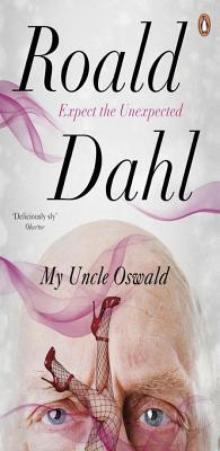 My Uncle Oswald
My Uncle Oswald The Best of Roald Dahl
The Best of Roald Dahl The Magic Finger
The Magic Finger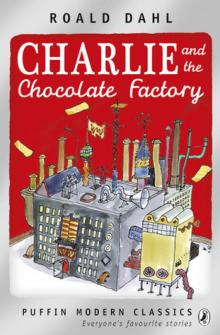 Charlie and the Chocolate Factory
Charlie and the Chocolate Factory Fantastic Mr Fox
Fantastic Mr Fox Matilda
Matilda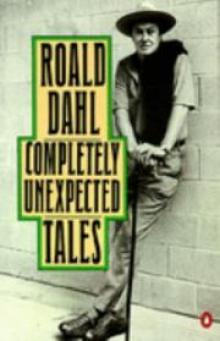 Completely Unexpected Tales: Tales of the Unexpected. More Tales of the Unexpected
Completely Unexpected Tales: Tales of the Unexpected. More Tales of the Unexpected The Wonderful Story of Henry Sugar and Six More
The Wonderful Story of Henry Sugar and Six More The Twits
The Twits The BFG
The BFG Danny the Champion of the World
Danny the Champion of the World The Witches
The Witches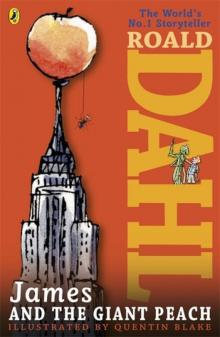 James and the Giant Peach
James and the Giant Peach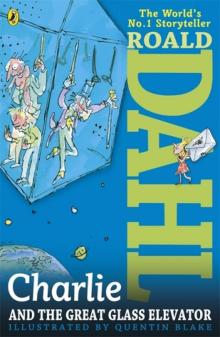 Charlie and the Great Glass Elevator
Charlie and the Great Glass Elevator Skin and Other Stories
Skin and Other Stories Kiss Kiss
Kiss Kiss Switch Bitch
Switch Bitch The Giraffe and the Pelly and Me
The Giraffe and the Pelly and Me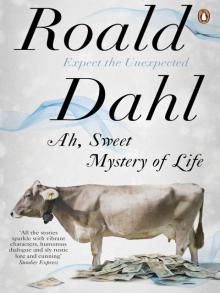 Ah, Sweet Mystery of Life
Ah, Sweet Mystery of Life Fear
Fear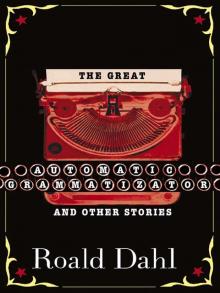 The Great Automatic Grammatizator and Other Stories
The Great Automatic Grammatizator and Other Stories Someone Like You
Someone Like You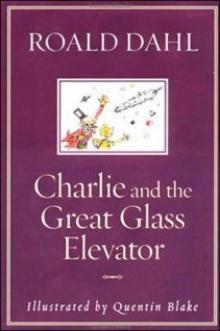 Charlie and the Great Glass Elevator c-2
Charlie and the Great Glass Elevator c-2 More About Boy
More About Boy Tales of the Unexpected
Tales of the Unexpected The Umbrella Man and Other Stories
The Umbrella Man and Other Stories Dirty Beasts
Dirty Beasts Roald Dahl's Mischief and Mayhem
Roald Dahl's Mischief and Mayhem The Collected Short Stories of Roald Dahl, Volume 1
The Collected Short Stories of Roald Dahl, Volume 1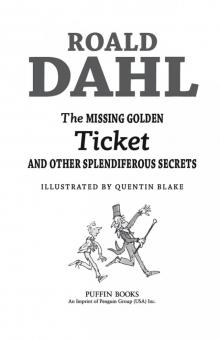 The Missing Golden Ticket and Other Splendiferous Secrets
The Missing Golden Ticket and Other Splendiferous Secrets Billy and the Minpins
Billy and the Minpins Over to You
Over to You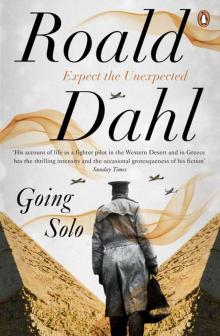 Going Solo
Going Solo Deception
Deception War
War Man from the South ee-3
Man from the South ee-3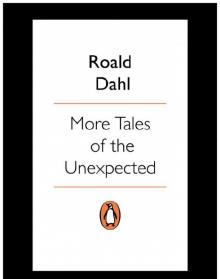 More Tales of the Unexpected
More Tales of the Unexpected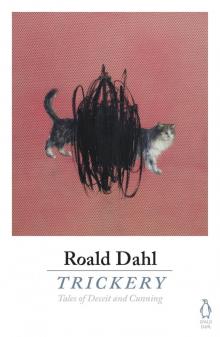 Trickery
Trickery Rhyme Stew
Rhyme Stew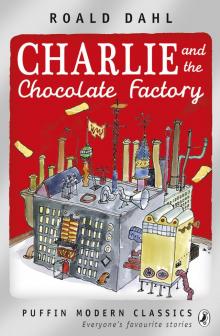 Charlie and the Chocolate Factory (Puffin Modern Classics relaunch)
Charlie and the Chocolate Factory (Puffin Modern Classics relaunch)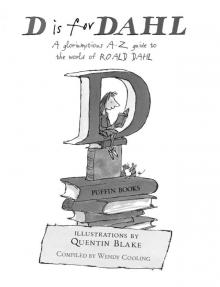 D is for Dahl
D is for Dahl Roald Dahl Whoppsy-Whiffling Joke Book
Roald Dahl Whoppsy-Whiffling Joke Book Spotty Powder and other Splendiferous Secrets
Spotty Powder and other Splendiferous Secrets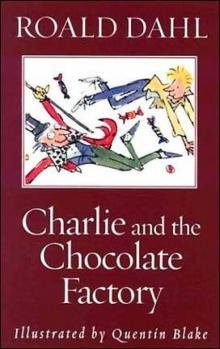 Charlie and the Chocolate Factory c-1
Charlie and the Chocolate Factory c-1 Boy
Boy Completely Unexpected Tales
Completely Unexpected Tales Madness
Madness Innocence
Innocence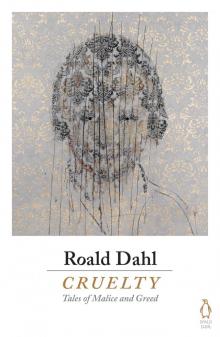 Cruelty
Cruelty George's Marvellous Medicine
George's Marvellous Medicine